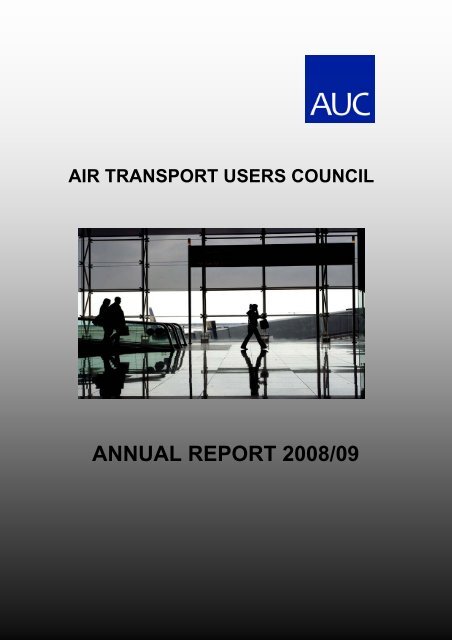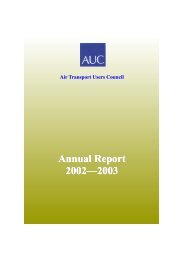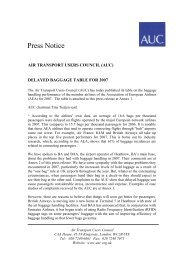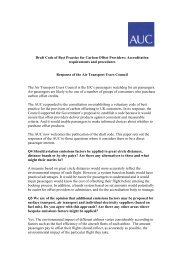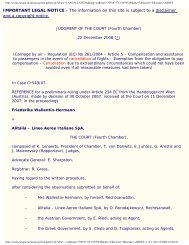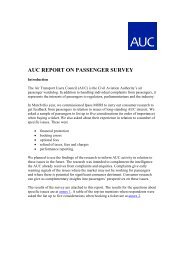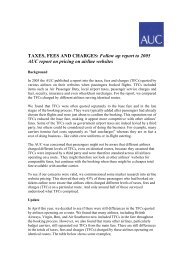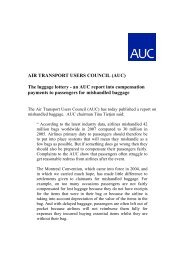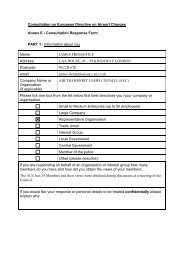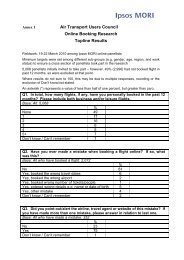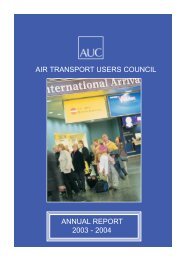Complaints and enquiries - Air Transport Users Council
Complaints and enquiries - Air Transport Users Council
Complaints and enquiries - Air Transport Users Council
You also want an ePaper? Increase the reach of your titles
YUMPU automatically turns print PDFs into web optimized ePapers that Google loves.
AIR TRANSPORT USERS COUNCIL<br />
ANNUAL REPORT 2008/09
1<br />
CONTENTS<br />
CHAIRMAN’S INTRODUCTION 2<br />
REVIEW OF THE YEAR 4<br />
<strong>Complaints</strong> <strong>and</strong> <strong>enquiries</strong> 4<br />
Representing passengers 12<br />
External relations 23<br />
THE AUC IN 2008/09 25<br />
Members 25<br />
Secretariat 28<br />
Terms of reference 29<br />
Financial summary 31<br />
GLOSSARY 32
2<br />
CHAIRMAN’S INTRODUCTION<br />
There has been much discussion about the future of air passenger<br />
representation in the UK in the past year. We have set out our own views on<br />
this in our response to the Government’s consultation on the future framework<br />
for the economic regulation of airports in UK, which included proposals for<br />
moving air passenger representation in the UK from the AUC to Passenger<br />
Focus, the body which represents rail <strong>and</strong> bus passengers.<br />
A copy of our detailed response can be found on our website. In short, our<br />
view is that we agree with the Government that the solution to capturing the<br />
consumer interest in regulatory decisions on economic regulation may lie in<br />
updating arrangements for air passenger representation. But where we differ<br />
from the Government, <strong>and</strong> the CAA, is in what is the best way to achieve this.<br />
We believe air passenger interests are best served by a sector-specific<br />
organisation, in particular because of the international <strong>and</strong> competitive<br />
characteristics of the air transport market.<br />
In the meantime, <strong>and</strong> against this backdrop of discussions over our future, our<br />
complaints team has been as busy as ever. We received 12,307 complaints<br />
<strong>and</strong> <strong>enquiries</strong> last year, an increase of 11% on the year before. But<br />
complaints are not just important on an individual basis. The complaints data<br />
is central to the work of an air passenger representation body; in a<br />
competitive market, it gives us an early warning sign of areas where there is<br />
consumer detriment. We can therefore use this “intelligence” to inform our<br />
advocacy work on behalf of all passengers.<br />
Over the past year, we have continued to investigate a wide range of<br />
consumer protection issues which have come to our attention through<br />
complaints. For example, the significant increase in booking tickets online has<br />
led to an increase in written complaints about reservation issues over the past<br />
few years; last year we received 425 written complaints compared to 211 in<br />
2005/06. This increase in complaints prompted us to publish our report on<br />
“Buying tickets online – an AUC report on the pitfalls of booking tickets over<br />
the internet” last May.<br />
However, many of the issues that passengers contact us about have already<br />
been addressed through recent legislation. For example, Regulation<br />
EC261/2004 on compensation <strong>and</strong> assistance in the event of denied<br />
boarding, cancellation <strong>and</strong> delay introduced provisions for redress <strong>and</strong><br />
assistance for delays <strong>and</strong> cancellations. And the Montreal Convention 1999,<br />
which came into force in 2004, increased maximum limits for mish<strong>and</strong>led
3<br />
baggage. Last year, Regulation EC 1008/2008 (“the third package”) came<br />
into force. This includes provisions that should in effect bring in clarity <strong>and</strong><br />
commonsense to airline pricing. In addition, we can use other generic<br />
consumer protection legislation to address areas of consumer detriment in air<br />
transport. For example, we frequently challenge airlines’ conditions of carriage<br />
by reference to the Unfair Terms in Consumer Contracts Regulations.<br />
But we continue to receive large numbers of complaints about alleged<br />
infringements of Regulation EC 261/2004. We also believe that the Montreal<br />
Convention has not brought about the benefits, in terms of settlements of<br />
claims for mish<strong>and</strong>led baggage, that we had hoped for. In addition, we note<br />
that many airlines have yet to fully comply with the provisions of the “third<br />
package”. And a number of airlines continue to include what appear unfair to<br />
us to be terms in their conditions of carriage.<br />
We believe that the priority now is for us to do as much as we can to ensure<br />
that the legislation in place is enforced by the relevant bodies to the benefit of<br />
passengers. In general, that means a greater emphasis on our advocacy work<br />
directed at individual carriers <strong>and</strong> at enforcement bodies, rather than at<br />
legislators or industry trade associations. We therefore see much of our role<br />
as increasingly being to identify issues of detriment as they arise <strong>and</strong> to feed<br />
this intelligence to enforcement bodies.<br />
Last year we continued to work with the CAA, the designated National<br />
Enforcement Bodies in EU Member States, <strong>and</strong> the European Commission on<br />
enforcement of Regulation EC261/2004. And we presented them with<br />
evidence of instances from our complaints where we considered that airlines<br />
had not complied with the rules. We also published a report on mish<strong>and</strong>led<br />
baggage settlements under the Montreal Convention. “The luggage lottery –<br />
an AUC report into compensation payments to passengers for mish<strong>and</strong>led<br />
baggage” concluded that the Convention had not brought about the benefits<br />
to passengers in terms of settlements for mish<strong>and</strong>led baggage that we had<br />
hoped for when it came into force in 2005. This report has since prompted the<br />
European Commission to consider an EU wide investigation of airline<br />
mish<strong>and</strong>led baggage settlements.<br />
So it has again been another packed year for the <strong>Council</strong>. I would like to thank<br />
my fellow Members of the <strong>Council</strong>, <strong>and</strong> also the executive team, for their<br />
support they have given me over the year. Their expertise <strong>and</strong> hard work has<br />
been invaluable to me in what has been a challenging, but ultimately<br />
productive, year for the AUC.<br />
Tina Tietjen
4<br />
REVIEW OF THE YEAR<br />
<strong>Complaints</strong> <strong>and</strong> <strong>enquiries</strong><br />
In 2008/09, the AUC h<strong>and</strong>led 12,307<br />
complaints <strong>and</strong> <strong>enquiries</strong> compared to<br />
11,077 the year before. Of these, 5953<br />
were in writing <strong>and</strong> 6354 were by<br />
telephone.<br />
We accept that the number of<br />
passengers who complain to us is tiny<br />
compared to overall passenger numbers.<br />
But we think the complaints we receive<br />
give an indication of the complaints<br />
received by airlines’ customer relations<br />
teams. And they often give us an inside<br />
track into the policy of an airline towards a<br />
particular issue.<br />
Details of written complaints <strong>and</strong><br />
telephone <strong>enquiries</strong> to the AUC are set<br />
out in the tables overleaf.<br />
A passenger had two watches<br />
stolen from his luggage on a<br />
trip back from the US. He<br />
claimed for the cost of the<br />
watches from the airline,<br />
enclosing copies of the receipts.<br />
However, the airline said that<br />
under its terms <strong>and</strong> conditions it<br />
was not liable for valuable<br />
items <strong>and</strong> referred him to his<br />
travel insurance. In the<br />
meantime the airline lost the<br />
receipts for the watches because<br />
of an “administrative error”, so<br />
the passenger could not claim<br />
from his insurers. The<br />
passenger wrote to us <strong>and</strong> we<br />
managed to persuade the airline<br />
to compensate the passenger for<br />
the cost of the lost watches.<br />
In addition, we had 113,000 hits on the<br />
advice pages on our website, compared<br />
to 160,000 the year before. We cannot be<br />
sure of the reason for such a decrease but we suspect it may be a result of an<br />
increasing number of alternative websites available that provide advice on air<br />
travel, many of which base their information on the advice pages on the AUC<br />
website. We are not concerned by the fall in the number of hits; so long as the<br />
information is getting out to passengers <strong>and</strong> it is correct <strong>and</strong> up to date, it<br />
does not matter where it comes from.
5<br />
Written complaints in 2008/09<br />
Type of complaint<br />
Number of complaints<br />
2008/09 2007/08<br />
Cancellations 2085 1982<br />
Delays 795 875<br />
Mish<strong>and</strong>led baggage 539 624<br />
Reservation issues 415 318<br />
Denied boarding 281 300<br />
Ticketing / refund issues 230 274<br />
Baggage allowance 160 117<br />
Diverted flight 150 104<br />
Missed connections 146 125<br />
Schedule changes 144 99<br />
In-flight services 133 121<br />
Missed departure 132 -<br />
Seating 102 105<br />
Taxes, fees <strong>and</strong> charges 93 32<br />
Special needs 64 56<br />
Documents 58 42<br />
Ground services 53 41<br />
Check-in problems 52 68<br />
Fares 39 57<br />
Security 37 51<br />
Other 245 191<br />
Total 5953 5582<br />
Missed departure was not categorised in 2007/08.
6<br />
Telephone <strong>enquiries</strong> in 2008/09<br />
Type of enquiry<br />
Number of <strong>enquiries</strong><br />
2008/09 2007/08<br />
Cancellations 1685 1545<br />
Delays 734 691<br />
Mish<strong>and</strong>led baggage 681 756<br />
Reservation issues 610 410<br />
Ticketing / refund issues 391 395<br />
Denied boarding 299 257<br />
Schedule changes 238 147<br />
<strong>Air</strong>line failure 231 98<br />
Taxes, fees <strong>and</strong> charges 158 70<br />
Baggage allowance 132 91<br />
Missed connections 129 107<br />
In-flight services 107 92<br />
Diverted flight 105 90<br />
Special needs 77 63<br />
Missed departure 69 -<br />
Documents 68 65<br />
Fares 61 94<br />
Seating 54 98<br />
Ground services 46 69<br />
Check-in problems 46 59<br />
Other 433 298<br />
Total 6354 5495<br />
Missed departure was not categorised in 2007/08.
7<br />
<strong>Complaints</strong> under Regulation EC 261/2004 on compensation <strong>and</strong> assistance<br />
for denied boarding, cancellation <strong>and</strong> delays<br />
Under Regulation EC 261/2004, the AUC is designated as the complaints<br />
h<strong>and</strong>ling body for passengers departing from UK airports, whilst the CAA is<br />
the designated enforcement body.<br />
We received 2919 written complaints that could be categorised as coming<br />
under Regulation EC 261/2004, compared to 2928 the year before. A<br />
breakdown of the number of complaints by type is in the table below.<br />
Type of complaint 2008/09 2007/08<br />
Cancellations 1968 1896<br />
Delays 681 790<br />
Denied boarding 252 242<br />
Downgrading 18 (not categorised)<br />
Total 2919 2928<br />
As with 2007/08, written complaints under the Regulation accounted for about<br />
half of the total complaints we received last year. However, the number of<br />
complaints under the Regulation decreased very slightly (in comparison to an<br />
11% increase in overall complaints).<br />
Delays<br />
We are pleased to report that complaints about delays decreased for the third<br />
year running. Last year we received 681 complaints compared to 790 in<br />
2007/08, <strong>and</strong> 1969 in 2005/6, the first full year after the Regulation came into<br />
force. We like to think that this is a sign that passengers are increasingly<br />
getting what they should be entitled to under the Regulation following a delay.<br />
However, complaints to us show that a number of airlines still continue to<br />
sometimes flout the rules (whether intentionally or not) when a flight is<br />
delayed.<br />
Cancellations<br />
<strong>Complaints</strong> about cancellations increased slightly in 2008/09 compared to<br />
2007/08. However, we are making headway in getting redress for passengers<br />
in terms of compensation. This is something which has often been difficult to<br />
achieve because under Regulation EC 261/2004 airlines do not have to pay<br />
compensation when a flight is cancelled under “extraordinary circumstances”,<br />
which airlines claim tends to be on<br />
most occasions. Last year we<br />
managed to get compensation for<br />
128 complainants who contacted<br />
us compared to 60 the year before.<br />
We had particular success in<br />
persuading one airline to
8<br />
compensate a number of passengers for cancellations caused by “crew<br />
shortages” – we argued that this was foreseeable (<strong>and</strong> therefore not an<br />
“extraordinary” circumstance) <strong>and</strong> could be prevented by rostering extra<br />
backup staff to cover for any shortages.<br />
Our success with these types of complaints <strong>and</strong> the recent European Court of<br />
Justice ruling on the “Wallentin” case (see box below) gives us renewed<br />
optimism that passengers will be in a better position in the future to pursue<br />
their right to compensation when their flight is cancelled.<br />
Summary of European Court of Justice Judgement C-549/07- Wallentin – Hermann<br />
22 December 2008<br />
Background<br />
Mrs Wallentin-Hermann’s flight from Vienna to Brindlisi on Alitalia was cancelled as a<br />
result of an engine defect which had been discovered the day before during a check.<br />
Following the airline’s refusal to pay her compensation, Mrs Wallentin-Hermann went to<br />
court in Austria. The Commercial Court, Vienna, made a reference to the Court of Justice<br />
of the European Communities about whether the technical problems which led to the<br />
cancellation of the flight were covered by ‘extraordinary circumstances’ under Regulation<br />
(EC) No 261/2004 <strong>and</strong> therefore would exempt Alitalia from the obligation to pay<br />
compensation.<br />
Judgement<br />
The Court of Justice found that “in the light of the specific conditions in which air travel<br />
takes place <strong>and</strong> the degree of technological sophistication of aircraft, airlines are<br />
confronted as a matter of course in the exercise of their activity with various technical<br />
problems to which the operation of those aircraft inevitably gives rise. The resolution of a<br />
technical problem caused by failure to maintain an aircraft must therefore be regarded as<br />
inherent in the normal exercise of an air carrier’s activity. Consequently, technical<br />
problems which come to light during maintenance of aircraft or on account of failure to<br />
carry out such maintenance do not constitute, in themselves, ‘extraordinary<br />
circumstances’.”<br />
However, it did not rule out altogether that technical problems could be considered<br />
“extraordinary circumstances”. It suggested that problems that stemmed from events<br />
“which are not inherent in the normal exercise of the activity of the air carrier concerned<br />
<strong>and</strong> are beyond its actual control” might be considered “exceptional circumstances”. For<br />
example, if a fleet of the aircraft were affected by a hidden manufacturing defect which<br />
impinged on flight safety.<br />
A passenger had a reservation for a flight from the Isle of Man to Birmingham.<br />
Unfortunately her flight was cancelled due to technical difficulties. The airline<br />
subsequently refused her claim for compensation. We took up her case with the<br />
airline <strong>and</strong> argued that, in light of the Wallentin ruling, the passenger was due<br />
£250 in compensation under Regulation EC261/2004. The airline subsequently<br />
paid up.
9<br />
Other issues<br />
Reservation issues<br />
Last year we received 415 written complaints about reservation issues,<br />
compared to 318 the previous year. The complaints covered a number of<br />
problems concerning making or changing a reservation. This included<br />
passengers being charged twice for a booking, incorrect names or dates<br />
being entered into the booking, <strong>and</strong> general confusion for consumers about<br />
the fees airlines charged to change reservations.<br />
We had hoped that we would have seen a decrease in complaints about<br />
reservation issues following the publication of our report on buying tickets<br />
online in May (see page 13). But instead complaints have increased<br />
significantly. This is<br />
disappointing. But maybe we<br />
shouldn’t be surprised; the<br />
increasing number of bookings<br />
(<strong>and</strong> changes to reservations)<br />
made online, combined with<br />
continual tinkering by airlines of<br />
their booking systems are going<br />
to create problems sometimes.<br />
<strong>Air</strong>line failure<br />
The financial failure of a number of airlines last year accounted for a<br />
significant increase in telephone <strong>enquiries</strong> about this issue. Last year we<br />
received 231 calls about airline failure compared to 98 the year before. In<br />
addition, there were 5512 hits on the advice page on financial protection on<br />
the AUC website compared to 2155 the year before. There were 1242 hits in<br />
April alone, following the failure of Oasis Hong Kong <strong>Air</strong>lines in that month.<br />
However, we only received 27 written complaints about this issue. This is<br />
probably because there is little we can do for passengers who find themselves<br />
stuck abroad or out of pocket<br />
following an airline going bust,<br />
apart from offer advice over the<br />
phone or through our website.<br />
Unless passengers are covered by<br />
their credit card or travel insurance<br />
they are unlikely to get their<br />
money back even with our help<br />
(see page 16).
10<br />
Schedule changes<br />
Last year we received a total of 382 complaints <strong>and</strong> <strong>enquiries</strong> about schedule<br />
changes compared to 246 the year before. <strong>Complaints</strong> to the AUC show that<br />
schedule changes can have a considerable impact on passengers’ trips. In<br />
some cases, they can undermine the whole reason for the trip in the first<br />
place. For example, a passenger might miss a business meeting or a family<br />
celebration. It can also leave them out of pocket if accommodation or<br />
transfers have been prepaid.<br />
A passenger arrived at Prestwick for a flight<br />
to Girona only to find that the flight had<br />
departed five hours earlier. The airline staff<br />
at the airport said that he should have been<br />
advised of the schedule change by email.<br />
However, the passenger had received no<br />
notification. He had to buy a new ticket for<br />
£166 for the next available flight which was<br />
the next day. And it meant that he could not<br />
use the hotel in Girona which he had already<br />
paid for. He wrote to the airline but all they<br />
would offer was refund of his original flight<br />
of £80. He therefore wrote to us. After we<br />
had taken the complaint up with the airline,<br />
he received a refund of £166 for cost of the<br />
replacement ticket <strong>and</strong> £50 for the hotel<br />
reservation.<br />
Many of the complaints to us<br />
are from passengers who have<br />
not been offered the option of a<br />
refund following a “significant”<br />
schedule change (see page 12<br />
for discussion on the term<br />
“significant”). Another common<br />
complaint is that passengers<br />
have not been advised of the<br />
change <strong>and</strong> have therefore<br />
missed their flight as a result.<br />
The increase in complaints<br />
prompted us to look closer at<br />
this issue last year (see page<br />
12).<br />
Missed departure<br />
Last year we introduced a new category of complaint – missed departure.<br />
This was for complaints we received from passengers who had missed their<br />
flight because they had arrived late at check-in or at the gate <strong>and</strong> had to buy a<br />
new ticket or were out of pocket for the flight they had missed. It is difficult to<br />
compare the numbers from last year with previous years because we<br />
categorised such complaints differently – for example, under ground services<br />
or security (that is, the purported reason for missed departure). But we<br />
introduced this new category because we considered it to be a significant<br />
issue in itself.<br />
<strong>Air</strong>lines’ conditions of carriage generally<br />
state that if a passenger arrives late for<br />
check-in or at the gate then the airline<br />
reserves the right to cancel the<br />
reservation with no refund. This is even<br />
if it is not the fault of the passenger – for<br />
example, if they had got stuck in a<br />
queue at security or the flight monitor<br />
was showing the wrong gate.
11<br />
We are pleased that at least one airline offers a “rescue fee” which<br />
passengers can pay in order to be rebooked onto the next available flight. We<br />
would like to see other airlines adopt a similar policy. However, we<br />
underst<strong>and</strong> why they might not wish to do so; it may let passengers get<br />
around restrictions put on tickets <strong>and</strong> undermine airline pricing structures.<br />
But we hope that such concerns could be overcome; possibly by setting a<br />
“rescue fee” at an amount that would not encourage passengers to use it to<br />
get round ticket restrictions. We plan to keep an eye on this issue. But it may<br />
be that airlines’ increasing use of checking-in online <strong>and</strong> at airport kiosks<br />
instead of check-in desks will cut out many of the delays that cause<br />
passengers to miss flights.
12<br />
Representing passengers<br />
Consumer protection issues<br />
This section looks at issues where the AUC has carried out proactive<br />
advocacy work on behalf of consumers. Much of our work on consumer<br />
protection issues is generated from complaints.<br />
Schedule changes<br />
Last autumn we carried out an online<br />
sweep of the conditions of carriage<br />
of a sample of airlines to find out if<br />
their condition on schedule changes<br />
complied with the Unfair Terms in<br />
Consumer Contracts Regulations<br />
(UTCCRs) (see box). The results of<br />
our sweep shows that policies on<br />
schedule changes vary between<br />
different carriers (see table on page<br />
13).<br />
Most carriers that belong to the<br />
International <strong>Air</strong> <strong>Transport</strong><br />
Association (IATA) offer passengers<br />
a refund for a significant change.<br />
Following a 1999 complaint from the<br />
AUC to the Office of Fair Trading<br />
(OFT) about airlines’ conditions of<br />
carriage, the OFT forced IATA to<br />
amend its Recommended Practice 1724<br />
(RP1724) on airlines’ Conditions of<br />
Carriage to bring it into line with the<br />
Unfair Terms in Consumer Contracts<br />
Regulations. One of the amendments<br />
was to give passengers the option of<br />
choosing a refund if the schedule<br />
change was “significant”. This<br />
amendment has helped many<br />
passengers get a refund following a<br />
schedule change.<br />
One airline even offers refunds following all schedule changes. However, a<br />
number of airlines do not offer passengers the option of a refund of their<br />
tickets, or only do so under strict criteria. The clauses on schedule changes in<br />
these airlines’ conditions could therefore be considered unfair under the<br />
UTCCRs.<br />
We are pleased to say that as a<br />
result of our discussions with two<br />
airlines following our sweep, one<br />
airline has changed its condition<br />
on schedule changes so that<br />
passengers can now get a refund<br />
following a “significant” schedule<br />
change. The other carrier has<br />
made a commitment to do so. But<br />
other airlines continue to not offer<br />
refunds. We therefore plan more<br />
work on this issue this year.
13<br />
Clauses on schedule changes in the conditions of carriage of selected airlines<br />
EasyJet<br />
Ryanair<br />
British <strong>Air</strong>ways<br />
BMI<br />
Flybe<br />
Jet2<br />
<strong>Air</strong>line Policy (as of August 2008)<br />
Fly Globespan<br />
Aer Lingus<br />
Thomsonfly<br />
Monarch<br />
Bmibaby<br />
Virgin<br />
Continental <strong>Air</strong>lines<br />
KLM<br />
Emirates<br />
<strong>Air</strong> Southwest<br />
Eastern <strong>Air</strong>ways<br />
<strong>Air</strong> France<br />
Online booking errors<br />
No refund<br />
Refund if change is more than three hours<br />
Refund if change is significant (RP1724)<br />
Refund if fail to operate “reasonably according to<br />
schedule”<br />
Refund if change is significant (RP1724)<br />
RP1724 but only refund return fare if return is within<br />
48 hours of outbound<br />
No refund (except for general refund policies)<br />
Refund if change is more than two hours<br />
Refund if change is significant (RP1724)<br />
No refund<br />
Refund if change is significant (RP1724)<br />
Refund if change is significant (RP1724)<br />
Refund but not at passenger option<br />
No refund<br />
Refund for all schedule changes<br />
Refund if change is significant (RP1724)<br />
Refund if change is significant (RP1724)<br />
“If change is not convenient for passenger <strong>and</strong> is not in<br />
a position to offer a more suitable reservation, the<br />
passenger may benefit from a refund”<br />
Taken from AUC research, October 2008<br />
In June, we published a report on the potential pitfalls to passengers when<br />
booking tickets online. We published the report because we were becoming<br />
increasingly disappointed by the way that some airlines h<strong>and</strong>led complaints<br />
where passengers had encountered problems booking tickets on the internet.<br />
We felt that the risk of something going wrong was being loaded too much<br />
onto passengers. Too many times they were left out of pocket following<br />
problems with bookings.<br />
We accepted that an error would sometimes be the fault of the person making<br />
the booking <strong>and</strong> the airline, under its ticket conditions, could then insist that<br />
they buy a new ticket. But we wanted airlines not to penalise passengers<br />
unduly for innocent mistakes (or seek to profit from the errors). In a number of<br />
the complaints we received, the airline had not lost out financially <strong>and</strong> the<br />
passenger had not gained any advantage (for example, if an error had caused<br />
a passenger to have more than one booking for a flight, the person could not<br />
use this ticket twice).
14<br />
Besides, we suggested that it was often difficult<br />
to tell where the fault lay. Many of the problems<br />
where it appeared that there had been an error<br />
could have been a result of a glitch somewhere<br />
in the airline’s reservation system. Passengers<br />
might therefore have been penalised when the<br />
error was not their fault.<br />
Our report aimed to both encourage<br />
passengers to notify an airline of a problem as<br />
soon as they could (by following instructions on<br />
the airline’s website if available) <strong>and</strong> to<br />
persuade airlines to change their policies<br />
towards passengers who encountered<br />
problems when booking on the internet. We<br />
sent a copy of the report, with an<br />
accompanying letter, to the chief executives of eight major UK carriers asking<br />
them to review their policies. We asked them to consider putting into place<br />
policies that gave more consideration to passengers who had difficulties<br />
booking online. We recommended they introduce a “24-hour rule” (see below)<br />
whereby passengers could cancel bookings within 24 hours of making the<br />
reservation.<br />
Ale<br />
We underst<strong>and</strong> that the<br />
A 24-hour rule<br />
We underst<strong>and</strong> that the majority of airline tickets are non-refundable<br />
<strong>and</strong> accept that airlines should be able to charge to rectify booking<br />
errors under some circumstances; for example, if the error only comes<br />
to light very close to departure. That is why we believe that an airline<br />
rule giving passengers the chance to make changes or claim a refund<br />
(even if subject to a small administration fee) within 24 hours of making<br />
a booking would provide passengers with at least some protection<br />
against being out of pocket. At least one airline already has such a term<br />
in its conditions.<br />
We received a positive response from most airlines – some airlines even<br />
introduced a 24-hour rule into their terms <strong>and</strong> conditions as a result of our<br />
report. Others took on board our views <strong>and</strong> said they would put in place<br />
internal policies along the lines of a 24-hour rule. They would also be<br />
generally more sympathetic to their customers. We will be keeping an eye on<br />
this issue <strong>and</strong> plan more work on this issue in the year to come. But we hope<br />
that such problems will diminish as passengers become more accustomed to<br />
internet shopping <strong>and</strong> as the online booking systems become more reliable.
15<br />
Settlements to passengers for mish<strong>and</strong>led baggage<br />
In March, we published a report on how<br />
airlines had h<strong>and</strong>led claims for compensation<br />
from passengers for mish<strong>and</strong>led baggage<br />
since the Montreal Convention came into force<br />
in 2004. The report was based on the<br />
complaints we had received in that period. We<br />
concluded that the implementation of the<br />
Montreal Convention had not brought about<br />
the benefits, in terms of settlements for<br />
mish<strong>and</strong>led baggage, that we had hoped for.<br />
We suggested that the risks associated with a<br />
bag being delayed, damaged or lost were still<br />
loaded too much on the passenger.<br />
We found that airlines tended to act in a way<br />
similar to insurance companies when settling<br />
claims for lost <strong>and</strong> damaged baggage. They generally expected passengers<br />
to provide receipts as proof of ownership for lost baggage, something which<br />
was not always practical. We thought that this was inappropriate; airlines,<br />
unlike insurance companies, were responsible for the bag being mish<strong>and</strong>led.<br />
And with delayed bags, we found that airlines often limited the amount a<br />
passenger could spend buying replacement items. We understood that<br />
airlines might want to make sure passengers spent reasonably but we<br />
considered that they should offer guidance on this <strong>and</strong> not arbitrary limits.<br />
We are pleased to say that our report had an immediate effect. On the 17 th<br />
March, Vice-President Tajani, the EU’s Commissioner for <strong>Transport</strong> noticed<br />
our report <strong>and</strong> published a press release stating that he would<br />
“take immediate measures on passenger rights starting with an investigation<br />
on the scale of the phenomenon. The European Commission's Directorate-<br />
General for <strong>Transport</strong> <strong>and</strong> Energy will ask today for information from the<br />
<strong>Air</strong>ports International <strong>Council</strong>, <strong>and</strong> the Association of European <strong>Air</strong>lines <strong>and</strong><br />
other parties concerned. The Commission will also contact AUC that was the<br />
first to reveal this information”.<br />
He said that the European Commission would then evaluate “the effective<br />
application of Regulation 889/2002 (Montreal Convention) on luggage loss<br />
<strong>and</strong> damage” <strong>and</strong> assess whether any improvements to the Regulation were<br />
required.<br />
The Commission has since contacted the relevant bodies in Member States,<br />
including the AUC, to request information on airline settlements under the<br />
Montreal Convention. We have sent to them a copy of our report <strong>and</strong> details<br />
of the complaints we have received. We look forward to helping the<br />
Commission further with its investigations.
16<br />
Financial protection<br />
Last year the failures of Oasis Hong Kong <strong>Air</strong>lines, Zoom <strong>and</strong> XL, amongst<br />
other airlines, left thous<strong>and</strong>s of British passengers str<strong>and</strong>ed abroad or, for<br />
those who were yet to travel, out of pocket. This is because there is no<br />
financial protection against the failure of schedule airlines in the UK as there<br />
is for tour operators (under the ATOL scheme).<br />
When an airline fails, passengers can get their airfare refunded from their<br />
credit card company under the Consumer Credit Act if they made their<br />
booking by credit card. But purchases made on credit cards must be above<br />
£100 <strong>and</strong> be made directly with the supplier. And many passengers do not<br />
pay for flight tickets with a credit card; they may not own one or they may wish<br />
to avoid credit card charges. Alternatively passengers can get their money<br />
back through their travel insurance. But few travel insurance policies offer<br />
cover against the failure of scheduled airlines <strong>and</strong>, of those that do, some<br />
have exclusions that appear to potentially dilute the cover.<br />
For a number of years, we have called for government to introduce a financial<br />
protection scheme for the failure of scheduled airlines similar to the ATOL<br />
scheme for tour operators. In 2005, we supported the CAA’s detailed proposal<br />
for a financial protection scheme for scheduled airlines. But the Government<br />
declined to take forward the CAA’s proposals.<br />
In October, our chairman wrote to Geoff Hoon, the then Secretary of State for<br />
<strong>Transport</strong>, about this issue. In her letter she suggested that the current<br />
economic climate <strong>and</strong> the increasingly competitive nature of the industry<br />
raised the spectre of a greater likelihood of airline failure. This, together with a<br />
background of consumers’ general lack of underst<strong>and</strong>ing of financial<br />
protection, had made air passengers increasingly vulnerable to the impact of<br />
an airline’s failure. Further, we suggested that this was clearly demonstrated<br />
by the numbers of passengers seemingly left out of pocket or str<strong>and</strong>ed abroad<br />
following recent failures.<br />
The AUC’s previous position in respect of scheduled airline failure has been<br />
that protection should be via a flat fee levy on all passengers to be paid into a<br />
common fund. This levy should cover passengers for reimbursement of<br />
monies <strong>and</strong> for those already abroad, completion of holiday <strong>and</strong> return home.<br />
We continue to hold this view <strong>and</strong> urge that detailed consideration be given to<br />
extending financial protection for air passengers, to include the failure of<br />
scheduled airlines.<br />
Despite the current economic climate <strong>and</strong> pressure from us <strong>and</strong> other industry<br />
stakeholders, the Government shows no sign of introducing a scheme.<br />
Perhaps our best hope may be to look to Europe. Last year, the European<br />
Commission commissioned a study to consider the impact on EU consumers<br />
of airline bankruptcies based on an analysis of the causes <strong>and</strong> situations<br />
surrounding aviation bankruptcies in the EU since 2000.
17<br />
Supplementary charges<br />
One of the most noticeable trends to have emerged in the airline industry in<br />
the last few years has been the increase in the number of supplementary<br />
charges for services that would previously have been paid for as part of the<br />
ticket. In the last year, many airlines have introduced an array of new charges<br />
<strong>and</strong> increased existing ones.<br />
We said in our annual report last year that we did not automatically consider<br />
such charges as bad news for passengers provided the charges were optional<br />
<strong>and</strong> for specific services. For passengers who did not need these services, it<br />
might mean the price they pay for their flight was lower as a result. We<br />
accepted it was an evolution of the market in response to the advent of<br />
no-frills air travel. And we concluded that as long as the charges remained<br />
optional then passengers should not be concerned at this development.<br />
We still hold this view. But complaints to the AUC show that not all<br />
passengers share it. Written complaints about taxes, fees <strong>and</strong> charges<br />
increased by nearly three times last year, mainly due to an increase in<br />
complaints about supplementary charges. Most complaints tended to be<br />
about the level of the charge rather than the principle; for example, many<br />
passengers considered that the credit <strong>and</strong> debit card charges were<br />
disproportionate to the cost to the airline of processing their booking. And they<br />
were concerned by how much card charges had increased in recent years<br />
(we compared the card charges of five airlines in October to four years<br />
previously - see table below). Complainants also felt other charges were often<br />
not good value, particularly reservation change fees <strong>and</strong> baggage fees.<br />
<strong>Air</strong>line<br />
February 2004 October 2008<br />
Credit debit Credit Debit<br />
British None None £4 per ticket None<br />
<strong>Air</strong>ways<br />
BMI £4 per person None £4 per person None<br />
EasyJet £4 per booking None 2.5% of<br />
booking<br />
(minimum<br />
£4.95)<br />
£1.95 per<br />
booking<br />
Flybe<br />
Ryanair<br />
£1.75 per<br />
person per<br />
sector<br />
£1.75 per<br />
person per<br />
sector<br />
£0.40 per<br />
person per<br />
sector<br />
£0.40 per<br />
person per<br />
sector<br />
£3.50 per<br />
person per<br />
sector<br />
£4 per person<br />
per sector<br />
£1.50 per<br />
person per<br />
sector<br />
£4 per person<br />
per sector<br />
Taken from AUC research, October2008<br />
We understood these concerns. But we pointed out to these passengers that<br />
the charges were optional. Some airlines did not charge for using credit or<br />
debit cards <strong>and</strong> even those that did allowed passengers to use a prepaid card<br />
for free. In addition, many airlines continued to include services, such as for<br />
baggage h<strong>and</strong>ling <strong>and</strong> seat allocation, as part of the fare. And being allowed
18<br />
to change the date or the name of a reservation for a fee was better than not<br />
being able to make a change at all <strong>and</strong> having to buy a new ticket, which was<br />
previously the case with most airlines.<br />
Consultations <strong>and</strong> Inquiries<br />
In addition to our primarily proactive advocacy work generated from<br />
complaints, we represent the interest of passengers through responding to<br />
consultations <strong>and</strong> inquiries. This section summarises a selection of the<br />
consultations. A full list is on page 22.<br />
Aviation Duty<br />
In April, we responded to the Treasury’s consultation on proposals to<br />
introduce an Aviation Duty to replace <strong>Air</strong> Passenger Duty (APD). The<br />
Government proposed to replace APD with a per plane tax on the grounds<br />
that this would better reflect the environmental impact of individual aircraft.<br />
We said that we had no objection<br />
in principle to environmental levies<br />
or taxes, provided there was a<br />
clear connection between the<br />
charges <strong>and</strong> the mitigation of the<br />
impact of aviation on the<br />
environment. But we had doubts<br />
whether a per-plane tax would<br />
achieve this better than APD.<br />
This was because the burden on<br />
airlines, <strong>and</strong> therefore potentially the amount payable by passengers, would<br />
be dependent on the destination of only the ex UK flight, in contrast to APD<br />
which is dependent on the final destination. Passengers going to long haul<br />
destinations might therefore have been more likely to choose to fly via a<br />
European hub airport instead of on a direct long haul flight from a UK airport.<br />
We suggested that this could potentially reduce the overall amount of tax<br />
collected by the Government.<br />
The Government has since dropped plans to introduce the tax <strong>and</strong> instead<br />
plans to increase APD from November 2009.<br />
<strong>Air</strong>port regulation<br />
Review of the economic regulation of airports in the UK<br />
In October, the Department for <strong>Transport</strong> (DfT) published a consultation on a<br />
review of economic regulation of airports in the UK. In its review, the DfT<br />
invited comments on its initial thinking on the rationale for intervention in the<br />
airport market <strong>and</strong> on a regulatory regime that was fit for purpose over the<br />
long term.
19<br />
The AUC’s principal concern was for the interests of passengers to be taken<br />
fully into account in all regulatory decisions. We believed that that this would<br />
be best achieved by giving the CAA a primary duty to consumers. We<br />
questioned whether airlines would always make decisions in the best interests<br />
of passengers – <strong>and</strong>, by extension, whether they could always be relied upon<br />
to act as proxy for passengers’ interests in discussion of airport charges.<br />
Different airlines would have different incentives in respect of airport<br />
investment decisions such as on timing, scale or quality. And those views may<br />
not always be completely aligned with their passengers’ aspirations. We<br />
suggested therefore that there was, in theory at least, an inherent potential<br />
conflict between shareholder profit aspirations <strong>and</strong> passenger interests in<br />
service quality.<br />
In addition, we suggested that regulation<br />
was only part of the solution. Good<br />
passenger experience at an airport<br />
depended equally on good management<br />
by airport companies <strong>and</strong> on the<br />
Government playing its part in the<br />
provision of surface access infrastructure<br />
<strong>and</strong> adequate resources for border<br />
control.<br />
In March, the DfT published a further,<br />
more detailed, consultation on the review<br />
of economic regulation. We submitted a<br />
response on the 2 nd June, a copy of which<br />
can be found on our website.<br />
Price control proposals for Stansted <strong>Air</strong>port charges for 2009-2014<br />
In December, the CAA published a consultation on its proposals for the<br />
setting of new price controls at Stansted <strong>Air</strong>port for the period 1 April 2009 to<br />
31 March 2014. Our major interest in the consultation concerned the CAA’s<br />
proposals on service quality in response to the Competition Commission’s<br />
(CC)’s finding that BAA had failed in its provision of airport services of<br />
adequate quality.<br />
We agreed with the CAA that the evidence put forward by the CC was<br />
sufficiently compelling for the CAA to propose to introduce a Service Quality<br />
Regime at Stansted similar to the ones already in place at Heathrow <strong>and</strong><br />
Gatwick. We considered that these regimes had provided passengers with a<br />
transparent <strong>and</strong> measurable benefit of price cap regulation.<br />
In March, the CAA published its decision on setting a price cap for Stansted<br />
from 2009-14. It introduced a regime with a set of service performance<br />
st<strong>and</strong>ards <strong>and</strong> rebates under which the airport operator would reimburse<br />
airlines up to seven per cent of airport charges where the airport’s service<br />
performance fell short of the defined st<strong>and</strong>ards. The CAA decided to base
20<br />
two-thirds of the st<strong>and</strong>ards <strong>and</strong> rebates on service performance in passenger<br />
security processing.<br />
CAA proposals for modifications to the Statement of St<strong>and</strong>ards <strong>and</strong> Rebates<br />
to include three additional elements<br />
In March, the CAA published a consultation proposing to introduce three new<br />
elements to the Service Quality Regime at Gatwick <strong>Air</strong>port – transfer search,<br />
staff searches <strong>and</strong> control post.<br />
We welcomed the CAA’s proposal to take into account the smaller number of<br />
transfer passengers at the airport when setting st<strong>and</strong>ards for queue times at<br />
transfer areas. We considered that it was not in the consumer interest for<br />
certain areas of the airport to be over resourced if increases in airport charges<br />
(due to additional staffing) were passed on to passengers by airlines through<br />
increases in airfares. We also welcomed the proposals to provide incentives<br />
to shorten queue times at staff search areas <strong>and</strong> control posts. We suggested<br />
that this could help improve punctuality because delays to staff in getting to<br />
their posts could delay departures.<br />
At the end of March, the CAA<br />
published the responses to the<br />
consultation <strong>and</strong> its decision. All<br />
respondents to the consultation<br />
agreed to the introduction of the new<br />
st<strong>and</strong>ards <strong>and</strong> the scope <strong>and</strong><br />
methods used to measure them. The<br />
CAA has therefore introduced the<br />
three new elements.<br />
HM Revenue <strong>and</strong> Customs / UK Border consultation on a draft code of<br />
practice on customs examination of baggage in the absence of passenger<br />
In July, HM Revenue <strong>and</strong> Customs <strong>and</strong> UK Border consulted on a draft code<br />
of practice on customs examination of baggage in the absence of passenger.<br />
This would set out the circumstances in which customs officers would carry<br />
out targeted checks on baggage in the absence of their owners <strong>and</strong> a<br />
framework of authorisation <strong>and</strong> supervision.<br />
Our main interest in this consultation was in making sure that innocent<br />
passengers received compensation for damage or delay to their baggage<br />
following searches by customs officers. We welcomed the commitment in the<br />
draft Code to compensate passengers. But we had concerns that details of<br />
the damage, as noted by officers, might not be released as evidence in order<br />
to help passengers with claims with airlines. We were also concerned that the<br />
draft Code had no provisions for compensation for bags delayed by the<br />
searches.
21<br />
Home Office / Department for <strong>Transport</strong> consultation on airport policing,<br />
funding <strong>and</strong> security planning<br />
In July, the Home Office <strong>and</strong> Department for <strong>Transport</strong> (DfT) consulted on<br />
their proposals to make airport security planning, <strong>and</strong> the funding <strong>and</strong><br />
activities of police at airports, more transparent <strong>and</strong> strategic in nature. This<br />
was with a view to putting airport policing <strong>and</strong> security planning proposals on<br />
a legislative footing as part of the <strong>Transport</strong> Security Bill.<br />
The consultation was primarily targeted at industry. But passengers have a<br />
direct interest in airport security. We therefore considered that the proposals<br />
should reflect the need for the travelling public to be protected from the range<br />
of security threats. We welcomed the objectives of the proposals to bring<br />
together the conflicting interests of stakeholders to produce a co-ordinated<br />
security regime across all UK airports. This would ensure there was a wideranging<br />
input into <strong>Air</strong>port Security Plans <strong>and</strong> Police Service Agreements at all<br />
airports in the UK.<br />
In September, the DfT published the responses to the consultation <strong>and</strong> its<br />
decision. Other responses to the consultation also highlighted the need for<br />
flexibility in the framework in order to bring together all stakeholders. The DfT<br />
has amended the draft legislation to provide a “more flexible framework which<br />
can be applied to all airports large <strong>and</strong> small”. It has also decided that, in<br />
order to make sure all views are taken into account, it, rather than an<br />
independent expert panel, should “take responsibility for resolving disputes<br />
over the contents or implementation of <strong>Air</strong>port Security Plans <strong>and</strong> Police<br />
Service Agreements”.
22<br />
Consultations <strong>and</strong> Inquiries<br />
Civil Aviation Authority<br />
Consultation on airport regulation; price control review - price control<br />
proposals for Stansted <strong>Air</strong>port<br />
Consultation on Gatwick <strong>Air</strong>port; CAA proposals for modification to the<br />
Statement of St<strong>and</strong>ards <strong>and</strong> Rebates to include three additional elements<br />
Department for <strong>Transport</strong><br />
Consultation on access to air travel for disabled persons <strong>and</strong> persons with<br />
reduced mobility – Code of Practice<br />
Review of economic regulation of airports<br />
HM Treasury<br />
Aviation Duty : A consultation<br />
HM Revenue <strong>and</strong> Customs / UK Border<br />
Consultation on a draft code of practice on customs examination of baggage<br />
in the absence of passenger<br />
Home Office / Department for <strong>Transport</strong><br />
Consultation on airport policing, funding <strong>and</strong> security planning<br />
Department for Communities <strong>and</strong> Local Government<br />
Consultation on the list of statutory consultees for National Policy Statement<br />
<strong>Transport</strong> Select Committee<br />
Inquiry into the future of aviation<br />
(all AUC consultation responses are available on the AUC website –<br />
www.auc.org.uk)<br />
AUC Reports<br />
Buying tickets online – an AUC report on the pitfalls of booking air tickets over<br />
the internet<br />
The luggage lottery – an AUC report into compensation payments to<br />
passengers for mish<strong>and</strong>led baggage
23<br />
External relations<br />
Media<br />
Last year we gave 407 media briefings, compared to 308 the year before,<br />
including participation in 80 TV <strong>and</strong> radio interviews. Most of our media work<br />
is reactive, as befits a small team that does not include a full time press<br />
officer. The increase was partly due to the large number of aviation stories in<br />
the news throughout the year. It was also a result of coverage generated from<br />
our four press releases over the year. We aim to be proactive in getting our<br />
message out to the public through the media. We think that this is important<br />
for many reasons. It helps put issues into the public domain <strong>and</strong> therefore<br />
bring them to the attention of both regulators <strong>and</strong> airlines. And it also helps us<br />
to get advice out to passengers, both in terms of how they can to avoid<br />
potential pitfalls when travelling <strong>and</strong> what to do if something should go wrong.<br />
Committees, working groups <strong>and</strong> coalitions<br />
Aberdeen <strong>Air</strong>port Consultative Committee<br />
<strong>Air</strong> <strong>Transport</strong> Action Group (ATAG)<br />
<strong>Air</strong> Travel Insolvency Protection Advisory Committee (ATIPAC)<br />
Aviation Health Working Group<br />
Consular Stakeholder Panel<br />
Disabled Person <strong>Transport</strong> Advisory Committee (DPTAC) Aviation working<br />
Group<br />
External Advisory Group (implementation of the White paper on the Future of<br />
<strong>Air</strong> <strong>Transport</strong>)<br />
Flying Matters<br />
Heathrow <strong>Air</strong>port Consultative Committee<br />
National Aviation Security Committee (associate member)<br />
National <strong>Air</strong> Traffic Services (NATS) Stakeholder <strong>Council</strong><br />
External visits (full <strong>Council</strong>)<br />
National <strong>Air</strong> Traffic Services Headquarters, Swanwick, Hampshire<br />
<strong>Air</strong>bus Headquarters, Toulouse, France
24<br />
Guest speakers at AUC <strong>Council</strong> meetings<br />
Alex Bristol, General Manager, National <strong>Air</strong> Traffic Services, Swanwick<br />
Janice Fisher, Manager Cabin Safety office, CAA<br />
Kieran Hanks, Economics <strong>and</strong> Regulation Director, BAA<br />
Liz Savage, Managing Director, Monarch Scheduled<br />
AUC lunch<br />
On October 16 th , we welcomed Willie Walsh, Chief Executive of British<br />
<strong>Air</strong>ways, to speak to invited guests from the aviation industry at an AUC<br />
lunch.
25<br />
THE AUC IN 2008/09<br />
Members (as of March 31 st 2009)<br />
Tina Tietjen – Chairman<br />
Tina Tietjen lives in London. She currently holds a number of non-executive<br />
positions in both the public <strong>and</strong> private sectors, <strong>and</strong> also provides consultancy<br />
services on training. She was previously joint managing director of Video Arts<br />
Ltd, an international training business <strong>and</strong> has recently become chair of the<br />
Willow Foundation which provides special days for seriously or terminally ill<br />
people between 16 <strong>and</strong> 40. She has travelled extensively throughout her<br />
career <strong>and</strong> continues to do so on a regular basis.<br />
Lynette Braithwaite<br />
Lynette Braithwaite is from Australia but has been based in the UK for the last<br />
twenty years, although for eight of these she lived in Indonesia, the UAE <strong>and</strong><br />
Russia. She is a qualified solicitor <strong>and</strong> has practised in the legal profession in<br />
various capacities. She is a member of both local <strong>and</strong> school representative<br />
bodies. She travels regularly by air, both long <strong>and</strong> short haul, for leisure<br />
(regularly visiting family spread around the world), <strong>and</strong> for her husb<strong>and</strong>’s<br />
business.<br />
David Brew<br />
David Brew lives in Edinburgh. He is a career civil servant, most recently in a<br />
senior capacity in the Scottish Government, though he is also a past chief<br />
executive of the Institute of Chartered Accountants of Scotl<strong>and</strong>. He has<br />
worked in the UK civil service <strong>and</strong> as a European Commission official. He has<br />
travelled extensively by air, both internationally <strong>and</strong> within the UK, over many<br />
years, for business <strong>and</strong> leisure.<br />
John Charlesworth<br />
John Charlesworth lives in Lincolnshire. He has spent the majority of his<br />
working life visiting <strong>and</strong> living in Africa <strong>and</strong> other parts of the developing world.<br />
He now runs a company looking after vehicle fleet management for the United<br />
Nations <strong>and</strong> aid <strong>and</strong> development organisations’ field projects. Due to the<br />
nature of his work, he travels extensively to remote destinations on a wide<br />
variety of airlines, as often as not in the economy section.<br />
Gillian Dale<br />
Gillian Dale has many years experience of teaching travel <strong>and</strong> tourism<br />
subjects in further education. She is currently an educational consultant <strong>and</strong><br />
works as an advisor with teachers in schools colleges <strong>and</strong> training providers.
26<br />
She has written several text books for travel <strong>and</strong> tourism courses, most of<br />
which have sections on the aviation industry. She flies regularly, particularly in<br />
Europe.<br />
Phillip Dann<br />
Phillip Dann lives in London. He is a solicitor advising in telecommunications<br />
law <strong>and</strong> public international law. He worked at Inmarsat, the sea, air <strong>and</strong> l<strong>and</strong><br />
mobile satellite agency. Later on, he was a partner at Bird & Bird in the City.<br />
In 1993, he had a stroke <strong>and</strong> aphasia, <strong>and</strong> now he is a trustee of Speakability,<br />
the aphasic charity.<br />
Arthur de Frisching<br />
Arthur de Frisching lives in London. Of Swiss background he has worked in<br />
the public sector in both executive <strong>and</strong> non-executive roles. He has travelled<br />
extensively in connection with human rights work <strong>and</strong> now flies mainly for<br />
leisure, including to South Africa where he has family connections.<br />
Nigel Evans<br />
Nigel Evans lives in Sunderl<strong>and</strong> <strong>and</strong> is currently deputy dean at Teesside<br />
Business School, part of Teesside University, having previously worked for<br />
fifteen years at Northumbria University. His writing <strong>and</strong> teaching focuses on<br />
strategic changes in the international travel industry. Prior to joining academia<br />
he had a varied commercial career with a tour operator. He travels regularly<br />
by air both for work <strong>and</strong> leisure.<br />
David Fraser<br />
David Fraser lives in Edinburgh, <strong>and</strong> was a chief executive in the public sector<br />
in Scotl<strong>and</strong>. He is chairman of the Castle Rock Edinvar Housing Association,<br />
Chairman of the Scottish Refugee <strong>Council</strong>, <strong>and</strong> a member of the UK Ethics<br />
Committee of the Department for Work <strong>and</strong> Pensions. He has a particular<br />
interest in how organisations can learn from complaints to improve the quality<br />
of service delivery.<br />
Jeanette Hebbert<br />
Jeannette Hebbert lives in Oxford. For over twenty-one years she was a<br />
headteacher of large comprehensives in London <strong>and</strong> Oxfordshire. She now<br />
works as an educational consultant for the Academies Trust <strong>and</strong> helps to<br />
coordinate the work of Higher Performing Schools. She is a Fellow of the<br />
Royal Society of the Arts <strong>and</strong> is a member of the Court of Oxford Brookes<br />
University. She travels extensively to the USA <strong>and</strong> Europe.<br />
Richard Lambert<br />
Richard Lambert lives in Cambridgeshire <strong>and</strong> is a civil engineer <strong>and</strong> transport
27<br />
planner who, for 20 years, was responsible for all planning <strong>and</strong> development<br />
at Birmingham International <strong>Air</strong>port. He retired in late 2001, but continues to<br />
lecture, write <strong>and</strong> provide consultancy services on transport <strong>and</strong> aviation<br />
matters, <strong>and</strong> continues to travel frequently by air for both business <strong>and</strong><br />
pleasure.<br />
Eric Melrose<br />
Eric Melrose lives in Aberdeen. He had a forty-four year career in local<br />
government, <strong>and</strong> was Director of Planning <strong>and</strong> Environment Services with<br />
Aberdeenshire County <strong>Council</strong> immediately before his retirement. He held a<br />
number of other senior positions, mostly related to Trading St<strong>and</strong>ards, <strong>and</strong> a<br />
number of national appointments with the Trading St<strong>and</strong>ard Institute <strong>and</strong><br />
Lacors. He worked on the development of Consumer Direct in Scotl<strong>and</strong>. He<br />
travels frequently by air for business <strong>and</strong> leisure purposes.<br />
Chris Parker<br />
Chris lives in Buckinghamshire. He has spent the majority of his career in the<br />
travel industry <strong>and</strong> has also worked for BMI, SITA <strong>and</strong> Galileo International.<br />
More recently he has been responsible for purchasing global travel <strong>and</strong><br />
events for Jaguar <strong>and</strong> L<strong>and</strong> Rover. Currently he works as an independent<br />
purchasing consultant. He travels extensively for business <strong>and</strong> pleasure.<br />
Francesca Phang-Lee<br />
Francesca Phang-Lee lives in Oxford. She is a lawyer <strong>and</strong> worked in an<br />
inhouse capacity for a number of years with General Electric (USA) <strong>and</strong> Shell<br />
Asia-Pacific. She travelled in a professional capacity on a regular basis<br />
throughout the Asia-Pacific region <strong>and</strong> to the USA. She continues to work as<br />
a lawyer, but also works in a voluntary capacity with local charities. She still<br />
loves travelling <strong>and</strong> now flies regularly to short haul <strong>and</strong> long haul destinations<br />
for leisure with her young family.<br />
Fiona Raje<br />
Fiona Raje lives in Northumberl<strong>and</strong>. She has worked in academic, research<br />
<strong>and</strong> operational roles in transport <strong>and</strong> has a doctorate from the University of<br />
Oxford. She has written books on transport <strong>and</strong> ethnicity <strong>and</strong> user<br />
experiences of the contemporary transport system. Having grown up in the<br />
Caribbean, she has travelled by air for many years.<br />
Kathryn Talintyre<br />
Kathryn Talintyre lives in Essex <strong>and</strong> spent twelve years pursuing a career in<br />
marketing <strong>and</strong> management consultancy. Following a period of volunteering<br />
at the local Adult Community College, she now teaches Skills for Life<br />
numeracy to adults. She travels regularly by air with her family.
28<br />
Secretariat (as of March 31 st 2009)<br />
Simon Evans - Chief Executive<br />
James Fremantle - Industry Affairs Manager<br />
Frances Walther - Consumer Affairs Manager (part time)<br />
Tina Dunkin - Consumer Affairs Supervisor (part time)<br />
Taruna Mistry - Consumer Affairs Supervisor (Operations)<br />
Paola Accardo - Consumer Affairs Officer<br />
Adrian Ghilotti - Consumer Affairs Officer<br />
Andrew Thompson - Consumer Affairs Officer<br />
Lucy Wickens - Consumer Affairs Officer<br />
Monica Bonello - Secretary / Administrator<br />
Alicia Mathurin-Greene - Administrative Assistant<br />
Nick Worrell - Administrative Assistant
29<br />
Terms of Reference<br />
Purpose<br />
The <strong>Air</strong> <strong>Transport</strong> <strong>Users</strong> <strong>Council</strong> (AUC) will complement <strong>and</strong> assist the Civil<br />
Aviation Authority (CAA) in its duties to further the reasonable interests of<br />
users of air transport services.<br />
Functions<br />
• To investigate complaints against the suppliers of air transport services<br />
where the person or body aggrieved has not been able to obtain<br />
satisfaction from the supplier concerned <strong>and</strong> to seek a resolution where<br />
appropriate.<br />
• To advise passengers, either directly or through the media, on how to<br />
make the best use of air transport services including, where appropriate,<br />
the publication <strong>and</strong> promotion of educational <strong>and</strong> statistical material.<br />
• To formulate <strong>and</strong> promote policies furthering the reasonable interests of<br />
passengers <strong>and</strong> to represent them to regulatory authorities (both in<br />
general <strong>and</strong> in relation to specific proposals), service providers <strong>and</strong> the<br />
media.<br />
• At the AUC’s discretion to co-operate with or be a member of any airport<br />
consultative committee.<br />
• At the AUC’s discretion to co-operate with or be a member of any<br />
consumer group, national or international, which can further the<br />
reasonable interests of passengers.<br />
• To carry out or commission research in support of the above objectives, if<br />
appropriate.<br />
Finance <strong>and</strong> Accountability<br />
• The functions of the AUC will be funded by the CAA. The AUC, consistent<br />
with its purpose, is permitted to obtain additional project funding <strong>and</strong> cofunding<br />
from other sources.<br />
• The AUC shall make an annual report to the CAA <strong>and</strong> publish it. The<br />
annual report shall include a financial summary.<br />
• Operational <strong>and</strong> financial objectives <strong>and</strong> performance indicators shall be<br />
agreed from time to time with the CAA. The AUC is subject to normal CAA<br />
internal audit requirements.<br />
• The CAA undertakes to respect the AUC’s freedom to propose changes in<br />
the Terms of Reference, determine policies <strong>and</strong> establish priorities in the<br />
performance of its functions within the framework of the agreed<br />
operational <strong>and</strong> financial objectives.<br />
Membership
30<br />
• The AUC shall consist of a Chairman <strong>and</strong> not more than 19 <strong>and</strong> not less<br />
than 11 Members.<br />
• Appointment of the Chairman will be made by the CAA for such period as<br />
considered appropriate.<br />
• Appointment of Members will be made by the CAA on the advice of the<br />
Chairman of the AUC. Such appointments will be for a term of three years<br />
which may be renewed for a maximum of one further term of three years.<br />
However, the fact that a Member has served for a maximum period will not<br />
necessarily preclude his or her serving as Chairman beyond the end of<br />
that time.<br />
• No employee of the CAA may be a Member of the AUC.<br />
• Members will be appointed as individuals <strong>and</strong> not as delegates of any<br />
particular interest group. They should represent as wide a range as<br />
possible of personal experience as users of air transport services.
31<br />
Financial summary<br />
The AUC receives its funding from the Civil Aviation Authority, as an Auxiliary<br />
Group within the CAA corporate structure. Secretariat staff are CAA salaried<br />
employees on st<strong>and</strong>ard CAA conditions of employment.<br />
The AUC budget for 2008/09 was £784,000 comprising the following (in<br />
£000):<br />
Staff 509<br />
Travel & Subsistence* 42<br />
Other operating 65<br />
Accommodation & IT 168<br />
Total 784<br />
*Staff travel <strong>and</strong> Members' expenses.
32<br />
GLOSSARY<br />
APD <strong>Air</strong> Passenger Duty<br />
ATOL <strong>Air</strong> Travel Organisers’ Licensing<br />
AUC <strong>Air</strong> <strong>Transport</strong> <strong>Users</strong> <strong>Council</strong><br />
CAA Civil Aviation Authority<br />
CC Competition Commission<br />
DfT Department for <strong>Transport</strong><br />
ECJ European Court of Justice<br />
EU European Union<br />
IATA International <strong>Air</strong> <strong>Transport</strong> Association<br />
OFT Office of Fair Trading<br />
UTCCRs Unfair Terms in Consumer Contracts Regulations
<strong>Air</strong> <strong>Transport</strong> <strong>Users</strong> <strong>Council</strong><br />
CAA House, 45-59 Kingsway, London, WC2B 6TE<br />
Telephone: 020 7240 6061 Fax: 020 7240 7071<br />
Website: www.auc.org.uk


